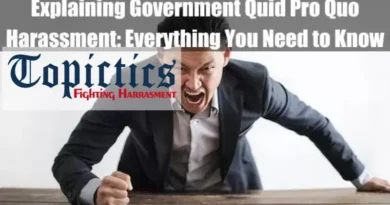Here are key takeaways from the article:
- In most business or personal transactions, quid pro quo is legal when both parties exchange something of value. This is the foundation of many contracts, such as paying for services or goods.
- It becomes illegal when used in the context of sexual harassment, such as when someone in power demands sexual favors in exchange for job benefits, which is prohibited under U.S. law.
- In politics, quid pro quo is illegal when it involves bribery or corruption, such as a public official trading favors or legislation for personal benefits like money or gifts.
- Lobbying and campaign contributions often fall into legal gray areas. While making donations to support political campaigns is legal, explicitly offering them in exchange for specific political favors could be considered illegal quid pro quo.

Let’s discuss this in detail:
Introduction
The legality of quid pro quo depends heavily on the context in which it occurs. In its simplest form, quid pro quo means “something for something” and refers to an exchange where each party provides something of value to the other. Such exchanges are often legal, particularly in business or personal transactions. However, certain types of quid pro quo arrangements can be illegal or unethical, especially when they involve power dynamics, coercion, or violate laws governing employment, bribery, or politics.
Legal Quid Pro Quo in Contracts
In most contractual agreements, quid pro quo is entirely legal. For instance, when two parties agree to exchange services for payment or goods, this forms a legally binding contract. This form of quid pro quo is the foundation of most business transactions. For example, an employer agreeing to pay an employee a salary in exchange for their work or a tenant paying rent in return for living in a property represents lawful quid pro quo under contractual law.

Illegal Quid Pro Quo in Sexual Harassment
However, quid pro quo becomes illegal when it involves certain inappropriate exchanges, such as sexual harassment. In employment settings, quid pro quo harassment occurs when a supervisor or person of authority demands sexual favors from an employee in exchange for job benefits like promotions, pay raises, or even job security. This type of quid pro quo is illegal under U.S. law, as it exploits power dynamics and coerces individuals into unwanted actions in exchange for professional advancement.
Quid Pro Quo in Bribery and Corruption

Quid pro quo also becomes illegal in cases of bribery and corruption. In the political sphere, an exchange in which a public official provides favors, decisions, or legislation in return for personal benefits, such as money or gifts, constitutes bribery. For instance, a politician who accepts campaign donations with an explicit agreement to pass legislation favorable to the donor would be engaging in an illegal quid pro quo.
Federal laws, such as the Federal Election Campaign Act, aim to limit such practices to prevent corruption in government. However, while FECA plays a significant role, other laws, like 18 U.S.C. § 201 (bribery of public officials), also address corrupt practices directly related to quid pro quo bribery.

The Gray Areas: Lobbying and Campaign Contributions
The legality of quid pro quo in politics can sometimes blur into gray areas, particularly when it comes to lobbying and campaign contributions. While giving money to support a politician’s campaign is legal, doing so with the expectation of specific political favors can cross the line into illegal quid pro quo. Courts have debated the fine line between legal lobbying and illegal bribery, but quid pro quo arrangements involving direct exchanges for political actions are generally illegal.
Conclusion
Quid pro quo is legal in many situations where it represents a fair exchange between parties, as seen in typical contracts or business dealings. However, it becomes illegal when it involves coercion, power abuse, or violations of employment, bribery, or campaign finance laws. Understanding the context and nature of the exchange is crucial in determining the legality of any quid pro quo arrangement.









